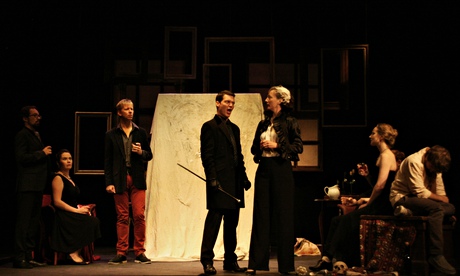
Performed as part of this year's Grimeborn festival, Tim Benjamin's Madame X is an allusive, postmodern thriller about artistic corruption. Benjamin cites Handelian opera and Jacobean revenge tragedy as his principal influences, though the libretto – the composer's own – glances at the works of Oscar Wilde, Lulu (Wedekind's rather than Berg's), and Peter Greenaway's The Cook, the Thief, His Wife and Her Lover, among many other things.
The starting point, however, is Mozart's Don Giovanni. Benjamin reimagines Masetto and Zerlina now living as penniless immigrants in London. He has become a talented portrait painter. She is the muse who haunts his work even when she is not its immediate subject. Among the denizens of the flashy art world that use and abuse them we also find a second Don, in the form of the wealthy Mr Wilmore, who offers to bail out the couple financially by buying Zerlina for an evening.
She agrees to the bargain, and the morning after the encounter, her mutilated body is found in a canal. We are not told whether Wilmore or a Ripper-type psychopath is the perpetrator, but Masetto's absinthe-fuelled fantasies of revenge gradually acquire paranormal implications, as his latest portrait – commissioned by the aristocratic Lady Brannoch – first takes on Zerlina's features, then develops a murderous supernatural life of its own.
Clever though this is, it creates problems on a number of fronts. The score, like the text, is overly referential, reminding us of Baroque opera, Dowland's songs, Brahms's waltzes, Mahler's ländlers and even Britten's Peter Grimes, in the scene in which Zerlina's corpse is discovered. Spotting the allusions eventually becomes an end in itself and detracts from the dramatic momentum. And, even though opera as a genre is not always noted for narrative exactitude, in places the plot strains credibility, both dramatically and psychologically: Zerlina's murder feels like a contrivance, and her agreement to Wilmore's offer sits uneasily with Benjamin's depiction of her emotional and sexual contentment in her relationship with Masetto.
The arty predators, meanwhile, come over as more interesting than their prey, which may be because the performances here are particularly strong. Marc Callahan's Wilmore exudes dangerous charisma both vocally and physically, while Taylor Wilson's Lady Brannoch is all hauteur and thrilling low notes. Tom Morss makes a touchingly naive Masetto. Laura Sheerin's Zerlina sounds good, but could do more with the words. A small instrumental ensemble plays decently for conductor Antony Brannick. Benjamin directs the opera himself with considerable theatrical flair.
• Until 27 August, then touring. Box office: 020-7503 1646. Venue: Arcola theatre

